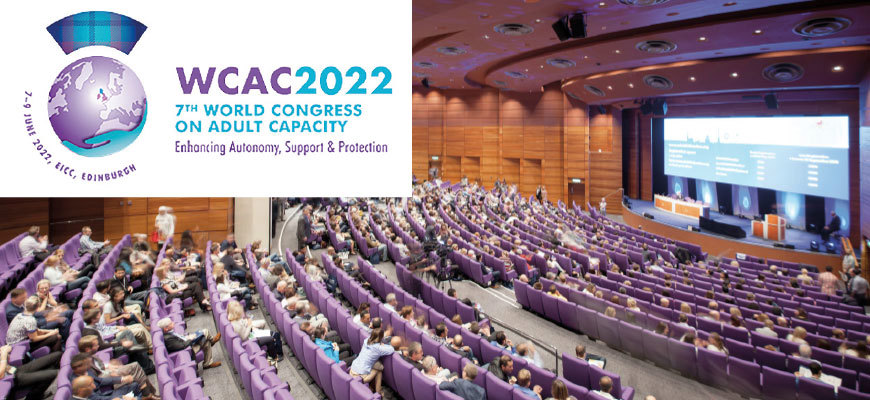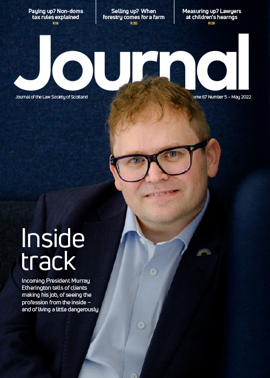WCAC: Seize the moment

After years of planning, and navigating the recent unexpected hazards, we are less than a month from realising Scotland’s unprecedented honour of hosting the 7th World Congress on Adult Capacity (EICC, Edinburgh, 7-9 June 2022).
It is a unique opportunity for Scots lawyers across all areas of relevant practice to enjoy a major learning experience regarding rapidly evolving practice around some of the most fundamental demands and challenges made to the essence of being a lawyer: the challenge to deliver just and human rights-compliant outcomes to and for all people having (or planning for) any of the hugely varied impairments of their abilities to act and transact effectively, and to exercise and safeguard their rights as other citizens can, in a free and democratic society.
As well as developing best practice, you will learn about all that is happening in Scotland, and across the world, to develop laws providing a suitable framework within which to meet those challenges appropriately. Best practice shapes the law, and law shapes best practice.
Common agenda
Scotland joins countries worldwide in working to the unifying agenda set by the United Nations Convention on the Rights of Persons with Disabilities. The Convention requires the full rights and status of people with disabilities to be respected and made real for them, where possible adopting principles of “universal design” to meet their needs, and where necessary building in reasonable accommodations. Failure to do so falls within the Convention’s definition of discrimination on grounds of disability. Convention obligations include ensuring that all disabled people receive all the support they need for the “exercise of their legal capacity”, and that maximum empowerment is balanced by appropriate safeguards. Delivering these sometimes conflicting concepts is the daily challenge for practitioners across all legal systems.
A key element is to ensure full access to justice, entailing unhindered access to suitable lawyers who are enabled to spend the often considerable amounts of time needed to enable such clients to convey to a lawyer, by one means or another, what they want in a particular situation. To do less violates both the Disability Convention and the European Convention. As an indication of what may be needed, see for example Scottish Borders Council v AB [2019] SC JED 85; 2020 SLT (Sh Ct) 4, where the sheriff commended a disabled person’s solicitor for spending time frequently over several months in order to ascertain adequately, and articulate to the court, the client’s own experience, position and wishes. Expect to return from the Congress freshly enthused, and empowered absolutely to resist any placing of budgetary or management convenience ahead of meeting the basic human rights of people most in need of empowerment and protection by the law.
Full programme
At the levels of policy and law reform, John Scott QC, chair of the Scottish Mental Health Law Review (Lord Scott by the time of the conference), has a prominent role and will lead a presentation by the review team, just a fortnight after conclusion of its current major consultation. Similarly prominent figures are among around 140 plenary speakers and presenters from some 29 countries and five continents whom you will have the opportunity to hear and – importantly – to interact with during the Congress. People from across the globe are converging on Edinburgh for the additional opportunities to meet new and familiar faces in person, and to participate fully in the event.
The full programme of plenary and parallel sessions is on the Congress website www.wcac2022.org, though look out for any final adjustments. The parallel sessions are gathered under five main themes:
- law, policy and practice review and reform;
- achieving respect for the adult’s rights, will, and preferences (with subdivisions on guardianship, supported decision-making, legal capacity, advance decision-making and other sub-themes);
- rights, ethics and law during national emergencies;
- research and ethics;
- monitoring, regulation, remedies and enforcement.
Headings however do not do justice to the wealth of information, research and leading-edge thinking on offer.
Society backing
Achieving funding has been a particular challenge for the organisers, with potential sponsors saying normally they would support such an event, but have frozen such activity in consequence of the uncertainties they themselves face. The current budget is nevertheless adequately funded; and that the Congress is happening at all is thanks in particular to two of its sponsors. At an early stage, and despite its own challenges, the Law Society of Scotland committed to major sponsorship and funded initial commitments to get the Congress “off the ground”. Then UK Government provided most generous underwriting and, again, remitted sufficient to cover basic costs. Sponsorship opportunities however remain: go to “Sponsors & exhibitors” on the website.
However, the best support that all practising lawyers can give is to register to attend, and join us as hosts when “the world is coming to Edinburgh”. Places still remain. To avoid disappointment, go now to the “Registration” link at the website quoted above.







